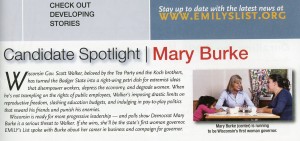#866 – Dick Bernard: The meaning of Mary Burke
Yesterday, the United States Supreme Court gave even more political power to Big Wealth. My in-box was full of talk about what this means for the country. Since I’d be described, correctly, as “leaning Left”, you can guess where my chatter comes from. I often rely on Alan at Just Above Sunset to summarize what the Big People (the pundit class) are saying about what National Stuff means. So, if you’re interested, here’s his overnight post on McCutcheon and what people are saying it means.
I prefer to take a different tack on this.
The only way the overwhelming majority of ordinary Americans can be defeated by Big Money is by voting against their own interests in November (which includes not voting at all, or voting for candidates who have not even a tiny chance of winning). There will be an abundance of both behaviors in November, 2014, and lots of inaction between now and November, including endless flailing away in counter-productive ways that will make a negative difference.
So, what about this “Mary Burke”?
She was the first face of the attack from the right I’ve seen this year. She’s only the first.
Early last month, we were treated to a seemingly endless series of political ads during the evening news on the local CBS affiliate, WCCO-TV.
They were short, sinister, and identical attack ads against someone I’d never heard of: Mary Burke.
They were also, likely, false by use of selective “facts”, headlines, etc. They might have been 15-30 seconds at most….
The ads didn’t even mention what office this Mary Burke was running for. Since we border on Wisconsin, just to the east, I figured that she might be running for something over there.
Turned out, she’s apparently a scary (for supporters of Wisconsin Gov. Scott Walker) presumed candidate for Wisconsin Governor in a few months.
(click to enlarge)
The ads, apparently paid for by a front group funded by the Koch Brothers billions, were intended to soften her up to the amorphous masses across the border.
Maybe the the ads will work. But only if the body politic are, in aggregate, damned fools and believe them….
Mary Burke seems a perfectly respectable candidate, successful businesswoman and all. Here’s the comment that followed the above photo: Mary Burke002
Apparently she’s scary to the opposition.
The Burke ad-buy has ended, for now.
Saturday we went to hear a succession of Democratic politicians speak at the annual Humphrey-Mondale dinner in Minneapolis. I wrote about that here.
At the dinner, popular U.S. Senator Al Franken spoke, predicting that he would soon be the subject of the same kind of attack ads, funded by the Koch machine.
Indeed, already it is so.
The same kind of dark, nebulous, identical attacks now greet us on TV at night, in this case tying Franken to President Obama, the IRS and the ACLU…similar to the formula utilized against Burke.
In both, the Team of Big Money paying Big Media is at work.
Will the tactic work?
We, the people, will decide that in a few months.
What is frightening to the Big Money interests is that there truly is no power like the power of the people.
Money, or Media, in and of themselves have no power at all. Neither can vote.
But the rest of the “people” have to figure that out within the next few months that their power doesn’t come from being fragmented, or insisting on purity of their particular essential position. And that Big Money has no interest in the little guys and gals, except its own greater wealth….
Someone said on Saturday night that 400 Americans now control as much wealth as the bottom 50% of Americans (there are over 310,000,000 Americans).
If true, (it seems to be, according to the respected PolitiFact), the rich are slowly destroying themselves, a fact they are blind to.
The rest of still have the right to vote, regardless of the efforts being made to erode that right in some places.
Vote.
Well informed.
Pass the word.






